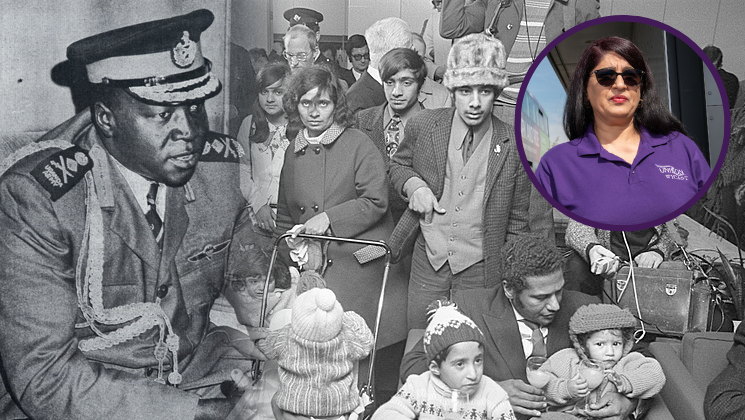Pam Sian is a UNISON Yorkshire & Humberside Assistant Regional Convenor, Branch Secretary, Convenor and Equalities Officer, and Vice-chair of the region’s Black Members’ Group. 50 years since her family were caught up in the expulsion of Asians from Uganda, she recalls the traumatic events.
On 4th August 1972, the President of Uganda, Idi Amin, ordered the expulsion of his country’s Asian minority, giving them 90 days to leave the country. At the time of the expulsion, there were approximately 80,000 individuals of Indian descent in Uganda. The expulsion took place against the backdrop of Anti-Indian sentiment in Uganda, with Amin accusing a minority of the Asians of disloyalty, non-integration, and commercial malpractice, claims that Indian leaders disputed. Amin defended the expulsion by arguing that he was “giving Uganda back to ethnic Ugandans”.
Family members who were caught up in expulsion tell a different story, however. They say that Idi Amin asked for the hand in marriage of a young Sikh girl and, when her family refused, Idi was so outraged that he vowed to make all Sikhs pay – thus expelling them from Uganda.
Many of Asians expelled were citizens of the United Kingdom and Colonies and 27,200 emigrated to the United Kingdom. Other refugees who were accounted for went to Canada, India, Kenya or Pakistan. In total, some 5,655 firms, ranches, farms, and agricultural estates were reallocated, along with cars, homes and other household goods.
At a young age Idi Amin joined the British colonial army, where he was known for his ambition, courage and cruelty. In January 1971, he staged a military coup and became the President of Uganda. His rule was brutal, earning him the title, “the Butcher of Uganda”.
Family members describe life in Uganda as carefree prior to 1971. They played in the streets without fear, visiting relatives and travelling to India during the school holidays. Education was the highest priority of parents, with children expected to pursue higher education. Living side by side with Hindus, Christians, and Muslims, they all learnt each other’s languages, exchanged food and celebrated every festival together. However, while there was respect for each other’s religion, marriage remained along community, caste, and faith lines.
All that was turned upside-down on 4th August 1972 when Idi Amin made a radio broadcast saying that Asians had 90 days to leave. Many thought this was a hoax, but Idi Amin spoke about following ‘his dream and being commanded by God’.
The announcement led to Indian homes becoming easy pickings, with many incidents of looting at gunpoint. Bank accounts and assets were frozen by the government, the luggage allowance on planes was 20kg and £50 in cash. Gold jewellery was one way to take money out of the country, but this became a liability as women were strip-searched, beaten, and raped by soldiers at roadblocks and at the airport. Discipline and the rule of law were replaced by chaos and anarchy.
Family members describe how hard it was saying goodbye to staff who had been so loyal. My uncle (dad’s brother-in-law) had, like many others, invested everything in Uganda – it was his home, he never wanted to leave. But overnight his business was closed down, leaving his staff without an income. My uncle gave each of his drivers a car or van in order to help them to start up their own businesses.
On arrival in England, family members were faced with racist remarks and were told to “go back home”. Politicians like Enoch Powell and the media stoked the fire.
I have memories of going to the Heathrow with my parents at the age of 8 to collect my uncle and family from the airport – thinking they were coming to live in England by choice, not understanding that they had lost their home and businesses overnight. My cousins experienced bullying at school while their parents struggled to find suitable employment. Many hated the idea of being on social security and accepted a job because that was the right thing to do. Businesses could not access support from the banks as they were not creditworthy, family members pooled human and financial resources and bought corner shops where everyone mucked in and worked long hours. Children continued their education with the hope of breaking the cycle of poverty.
Luckily for my uncle, he was one of the many Asians who was able to go back to Uganda a decade or so ago and reclaim the property he left behind. I say luckily because, in all the turmoil, he had the foresight to bring the property deeds with him and because his then employees and descendants kept the business running, continuing to earn a living and being able to support their families. In my uncle’s case he sold the property to the workers and gifted the business to them – after all, they had kept it going for over 40 years.
As my family members who experienced the expulsion first-hand have said, we must tell these stories while the survivors are still alive. If we don’t tell them ourselves, someone else will, according to their own interpretation. The anniversary is a wonderful opportunity for educating the younger generation to know their history and heritage.
Sources: historical detail via Wikipedia, images via Wikimedia Commons (Asian Ugandans travelling through Schipol Airport in 1972 credited to Bert Verhoeff / Anefo & Idi Amin credited to the Archives New Zealand). The images have been modified to overlap.






